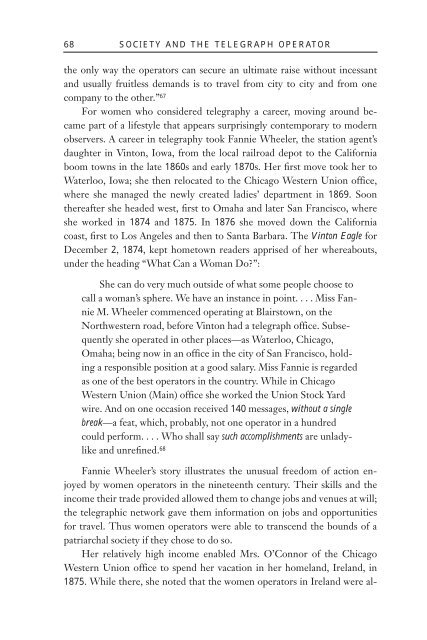My Sisters Telegraphic: Women in the Telegraph Office ... - Monoskop
My Sisters Telegraphic: Women in the Telegraph Office ... - Monoskop
My Sisters Telegraphic: Women in the Telegraph Office ... - Monoskop
You also want an ePaper? Increase the reach of your titles
YUMPU automatically turns print PDFs into web optimized ePapers that Google loves.
68<br />
SOCIETY AND THE TELEGRAPH OPERATOR<br />
<strong>the</strong> only way <strong>the</strong> operators can secure an ultimate raise without <strong>in</strong>cessant<br />
and usually fruitless demands is to travel from city to city and from one<br />
company to <strong>the</strong> o<strong>the</strong>r.” 67<br />
For women who considered telegraphy a career, mov<strong>in</strong>g around became<br />
part of a lifestyle that appears surpris<strong>in</strong>gly contemporary to modern<br />
observers. A career <strong>in</strong> telegraphy took Fannie Wheeler, <strong>the</strong> station agent’s<br />
daughter <strong>in</strong> V<strong>in</strong>ton, Iowa, from <strong>the</strong> local railroad depot to <strong>the</strong> California<br />
boom towns <strong>in</strong> <strong>the</strong> late 1860s and early 1870s. Her first move took her to<br />
Waterloo, Iowa; she <strong>the</strong>n relocated to <strong>the</strong> Chicago Western Union office,<br />
where she managed <strong>the</strong> newly created ladies’ department <strong>in</strong> 1869. Soon<br />
<strong>the</strong>reafter she headed west, first to Omaha and later San Francisco, where<br />
she worked <strong>in</strong> 1874 and 1875. In 1876 she moved down <strong>the</strong> California<br />
coast, first to Los Angeles and <strong>the</strong>n to Santa Barbara. The V<strong>in</strong>ton Eagle for<br />
December 2, 1874, kept hometown readers apprised of her whereabouts,<br />
under <strong>the</strong> head<strong>in</strong>g “What Can a Woman Do?”:<br />
She can do very much outside of what some people choose to<br />
call a woman’s sphere. We have an <strong>in</strong>stance <strong>in</strong> po<strong>in</strong>t. . . . Miss Fannie<br />
M. Wheeler commenced operat<strong>in</strong>g at Blairstown, on <strong>the</strong><br />
Northwestern road, before V<strong>in</strong>ton had a telegraph office. Subsequently<br />
she operated <strong>in</strong> o<strong>the</strong>r places—as Waterloo, Chicago,<br />
Omaha; be<strong>in</strong>g now <strong>in</strong> an office <strong>in</strong> <strong>the</strong> city of San Francisco, hold<strong>in</strong>g<br />
a responsible position at a good salary. Miss Fannie is regarded<br />
as one of <strong>the</strong> best operators <strong>in</strong> <strong>the</strong> country. While <strong>in</strong> Chicago<br />
Western Union (Ma<strong>in</strong>) office she worked <strong>the</strong> Union Stock Yard<br />
wire. And on one occasion received 140 messages, without a s<strong>in</strong>gle<br />
break—a feat, which, probably, not one operator <strong>in</strong> a hundred<br />
could perform. . . . Who shall say such accomplishments are unladylike<br />
and unref<strong>in</strong>ed. 68<br />
Fannie Wheeler’s story illustrates <strong>the</strong> unusual freedom of action enjoyed<br />
by women operators <strong>in</strong> <strong>the</strong> n<strong>in</strong>eteenth century. Their skills and <strong>the</strong><br />
<strong>in</strong>come <strong>the</strong>ir trade provided allowed <strong>the</strong>m to change jobs and venues at will;<br />
<strong>the</strong> telegraphic network gave <strong>the</strong>m <strong>in</strong>formation on jobs and opportunities<br />
for travel. Thus women operators were able to transcend <strong>the</strong> bounds of a<br />
patriarchal society if <strong>the</strong>y chose to do so.<br />
Her relatively high <strong>in</strong>come enabled Mrs. O’Connor of <strong>the</strong> Chicago<br />
Western Union office to spend her vacation <strong>in</strong> her homeland, Ireland, <strong>in</strong><br />
1875. While <strong>the</strong>re, she noted that <strong>the</strong> women operators <strong>in</strong> Ireland were al-

















